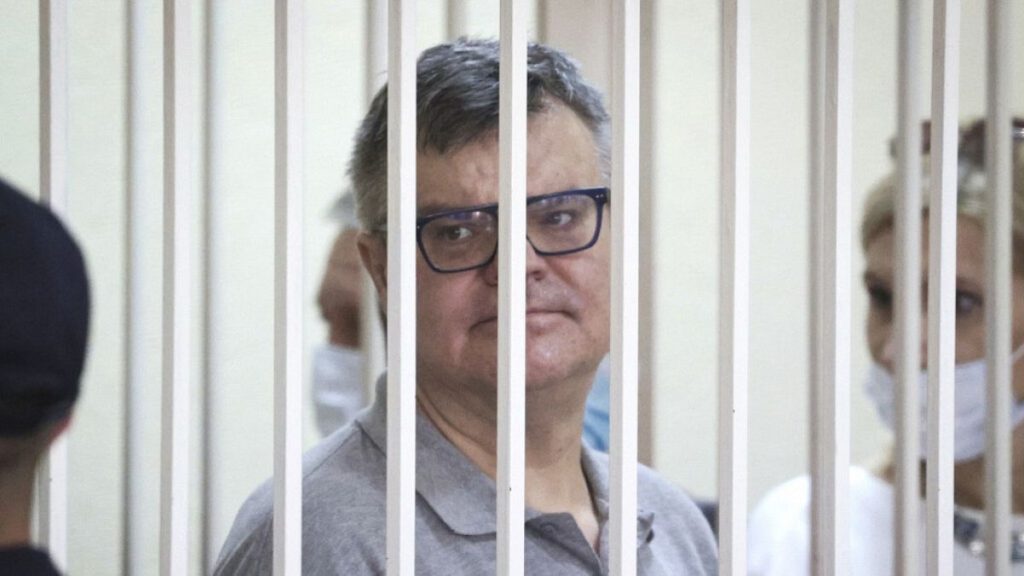The sudden reappearance of jailed Belarusian opposition figure Viktar Babaryka in a recently released video has sparked both relief and concern, raising questions about the Belarusian government’s motives and the plight of political prisoners in the country. Babaryka, a former banker who challenged President Alexander Lukashenko in the highly contested 2020 election, had been held incommunicado for nearly two years, prompting fears about his well-being, particularly after reports of his hospitalization with signs of beatings. The video, posted by a former opposition journalist now aligned with the government, shows a visibly thinner Babaryka wearing a prison uniform marked with a yellow tag, signifying his status as a political prisoner and subjecting him to harsher conditions. The timing of the video’s release, just weeks before a presidential election virtually guaranteed to extend Lukashenko’s three-decade rule, has fueled speculation that it is a calculated move by the authorities to preempt accusations of enforced disappearances and to present a semblance of transparency.
Human rights groups, including Viasna, have expressed deep concern about Babaryka’s condition and the broader context of political repression in Belarus. They view the video as a chilling reminder of the brutal crackdown on dissent that followed the 2020 election, which saw mass protests met with violent suppression, arbitrary arrests, and widespread human rights abuses. Babaryka’s case is emblematic of the plight of over a thousand political prisoners currently languishing in Belarusian jails, subjected to harsh conditions, denied contact with their families, and often held incommunicado. The European Parliament has repeatedly called for the release of Babaryka and other political prisoners, highlighting the ongoing human rights crisis in the country.
The 2020 Belarusian presidential election was a watershed moment, marked by widespread allegations of vote-rigging and a subsequent wave of protests demanding free and fair elections. The government’s response was swift and brutal, with tens of thousands arrested and thousands subjected to police brutality. Prominent opposition figures, including Babaryka, were imprisoned on dubious charges, effectively silencing dissenting voices and consolidating Lukashenko’s grip on power. Many opposition leaders, including Sviatlana Tsikhanouskaya, who emerged as a key figure in the opposition movement, were forced into exile. Tsikhanouskaya, while relieved to see Babaryka alive, has called for the release of information about other political prisoners held incommunicado, including her own husband, Siarhei Tsikhanouski, who was also imprisoned for challenging Lukashenko.
The circumstances surrounding the release of the Babaryka video further complicate the narrative. Roman Protasevich, the former opposition journalist who posted the video, has himself been a subject of controversy. Arrested in 2021 after his Ryanair flight was forced to land in Minsk under false pretenses, Protasevich was subsequently imprisoned on extremism charges but later pardoned after expressing support for Lukashenko. His apparent shift in allegiance has raised questions about the nature of his cooperation with the authorities, with some speculating that he is acting under duress while others believe he has become a government collaborator. Human rights groups consider Protasevich a hostage of the regime, raising doubts about the authenticity and voluntariness of his actions, including the release of the Babaryka video.
The ongoing political repression in Belarus has drawn international condemnation, with human rights organizations and international bodies repeatedly calling for the release of political prisoners and an end to the government’s crackdown on dissent. The case of Viktar Babaryka serves as a stark illustration of the challenges faced by those who dare to challenge the authoritarian regime, highlighting the pervasive climate of fear and intimidation that has gripped the country. The arbitrary arrests, unfair trials, and harsh prison conditions faced by political prisoners underscore the urgent need for greater international pressure on the Belarusian government to respect human rights and fundamental freedoms.
The reappearance of Babaryka, albeit under controlled circumstances, has brought renewed attention to the plight of political prisoners in Belarus. While the video may be an attempt by the authorities to manage public perception and deflect criticism, it has also inadvertently highlighted the ongoing human rights abuses and the precarious situation faced by those who dare to oppose the regime. The international community must continue to monitor the situation closely and advocate for the release of all political prisoners and the restoration of democratic freedoms in Belarus. The upcoming presidential election, likely to further solidify Lukashenko’s grip on power, serves as a crucial moment for renewed international engagement and pressure to address the ongoing human rights crisis.














